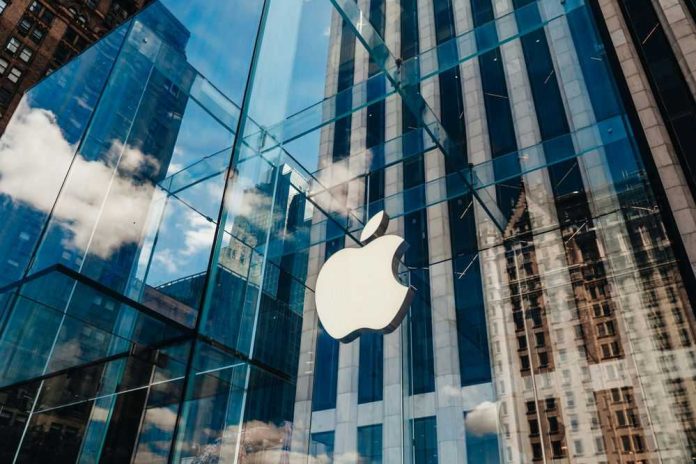
Apple’s ongoing embrace of China’s communist state isn’t just a business strategy—it’s a risk to American innovation, national security, and the livelihoods of our own citizens.
At a Glance
- Apple’s business is deeply entangled with China’s government and state-controlled labor system.
- The company’s profits and dominance depend on a supply chain “captured” by Chinese interests.
- Apple’s knowledge transfer has empowered Chinese competitors, threatening U.S. tech leadership.
- Public gestures toward diversification haven’t broken Apple’s dependency on China’s manufacturing apparatus.
Apple’s Faustian Bargain: Profits First, American Interests Last
Apple’s meteoric rise is the envy of Silicon Valley, but the dirty little secret behind its success isn’t American ingenuity or some mythical “garage startup” story. It’s China—more specifically, the sprawling, state-orchestrated labor machine that props up Apple’s entire global supply chain. When Apple moved production to China in the early 2000s, it wasn’t chasing innovation; it was chasing cheap labor, government kickbacks, and a regime happy to bend over backward for foreign tech—so long as it advanced China’s own ambitions. While American workers watched their jobs vanish and small towns were hollowed out, Apple’s profits soared from a paltry $69 million in 2003 to a staggering $41.7 billion by 2012. That’s not the free market at work; that’s a foreign government playing puppet master, and Apple dancing to their tune.
Tim Cook and his boardroom elite love to talk about “values,” but those values seem to vanish the second Beijing comes calling. Apple’s manufacturing partners—think Foxconn and other industrial giants—operate at a scale and with a ruthlessness that would make any American regulator shudder. The Chinese Communist Party orchestrates labor flows, incentivizes foreign investment, and ensures that every iPhone rolling off the assembly line doubles as another brick in the Great Wall of Chinese tech dominance. Apple’s story is more than a cautionary tale; it’s a glaring example of what happens when corporate America puts profit ahead of principle and the Constitution gets trampled beneath a pile of export paperwork.
China’s Leverage: How Apple Became “Captured”
The new book “Apple in China” by Patrick McGee lays out, in excruciating detail, just how vulnerable Apple has made itself—and by extension, how vulnerable America’s tech sector is. The Chinese government didn’t just provide cheap labor; it engineered a system where Apple could only thrive by making itself dependent on Beijing’s whims. Apple’s relentless demand for perfection and scale meant they needed China’s flexible, state-driven workforce—over 220 million migrant workers at the regime’s disposal. In return, China extracted what it wanted: technical know-how, manufacturing expertise, and control over the world’s most valuable brand’s lifeline. Apple may be run from Cupertino, but its fate is decided in Beijing’s smoky backrooms.
Publicly, Apple has tried to reassure Americans by promising to “diversify” its supply chain—moving a few token operations to India or Vietnam. But the facts are clear: the company’s core remains welded to China’s industrial complex. Every public gesture is just that—a gesture. Meanwhile, Apple’s continued presence and technological investment in China have allowed local competitors to rapidly catch up. The knowledge transfer is real, and it’s already resulting in Chinese firms challenging Apple’s dominance, not just at home, but on the global stage. So much for protecting American leadership in technology.
Strategic and Moral Costs: Who Pays the Price?
This is more than just a business risk. When a company as powerful as Apple is “captured” by a foreign adversary, America’s leverage evaporates. China’s grip over Apple means that the Chinese Communist Party can, at any moment, squeeze concessions—on censorship, on data, on intellectual property. Apple has already complied with Chinese censorship demands and agreed to store Chinese user data within China, under Beijing’s control. That isn’t just business as usual; it’s an American company bowing to authoritarianism and eroding freedom of speech and privacy. And if the Chinese state ever wants to punish the U.S. or twist Apple’s arm for political gain, they have the power to do it.
Meanwhile, the human cost is conveniently ignored by Apple’s PR machine. Chinese workers endure grueling, exploitative conditions with little recourse, all while American consumers are kept blissfully ignorant by shiny product launches and empty slogans about “values.” The American middle class pays the price in lost jobs, lost innovation, and a tech sector that increasingly looks like a branch office of the Chinese state. The real kicker? Apple’s supply chain model has set a precedent that other tech giants now follow, deepening our national dependence on a regime fundamentally at odds with American ideals.
Is Apple’s China Addiction Breaking America?
Patrick McGee’s book isn’t just a business exposé—it’s a wake-up call for anyone who cares about American sovereignty, economic strength, and the rule of law. When U.S. companies are so intertwined with a hostile power, they put the entire nation at risk. Apple’s “success” has come at the expense of our own strategic interests, our workers, and our values. The supposed “diversification” of supply chains is mostly window dressing; the core problem remains. As long as Apple and others continue to enrich and empower the Chinese Communist Party, America’s technological edge, economic security, and even our national independence will hang by a thread. If that doesn’t make your blood boil, check your pulse.
If American leadership and tech dominance matter, it’s time to demand real accountability and real change. Because no company—no matter how profitable or beloved—should ever be allowed to trade away our future for their bottom line.
Sources:
Simon & Schuster publisher page














